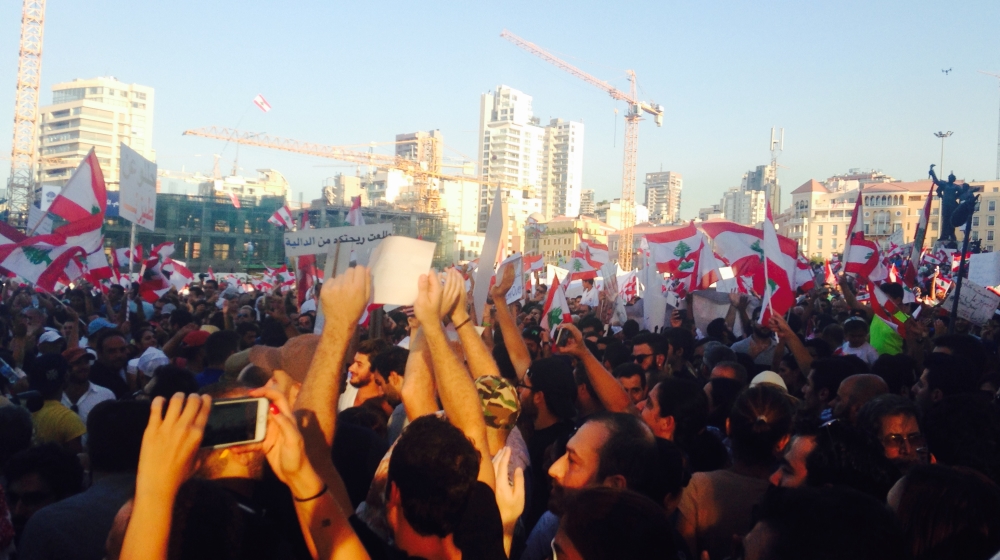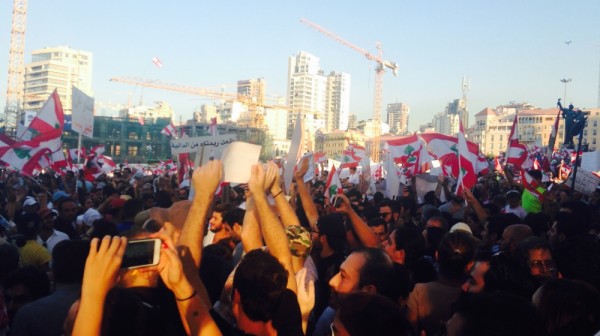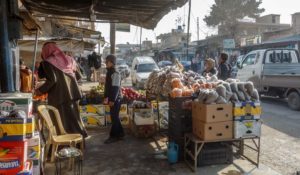
By: Agencies
Source: MWC News
At least 10,000 people have gathered in downtown Beirut to protest against the government, calling for the resignation of officials responsible for the current services crisis and for new elections.
The atmosphere at Saturday’s rally was festive with families, old and young attending carrying signs, singing songs and shouting chants.
Some banners held up by the crowds called for the downfall of the government while others listed demands including accountability, fixing the garbage crisis, and removing the 128 parliamentarians from office.
Sandwich stands and ice cream trucks were rolled out, providing food and drinks to those attending.
“People are not ‘welcome’ to join, people should join – it’s their duty as Lebanese citizens to come down today,” Marwan Azzi, a 34-year-old business man from Mount Lebanon, said. “We are all here today because we are sick of the politicians taking us for fools.”
Protest organisers said the rally had drawn 30,000-40,000 people, while security sources put the figure at 10,000.
Wissam Saliba, a 26-year-old producer, said: “This is the first time ever we are waking up and breaking the old system that has chained us. We are fighting for our basic human rights.”
The protest follows several weeks of tensions over the country’s ongoing rubbish disposal issue and the government’s failure to provide other services such as water and electricity.
Protesters are also demanding the release of all protesters detained in previous demonstrations.
Security forces were conspicuously out of sight on Saturday, following bouts of violence at the previous protests.
At one point the security forces unfurled a massive banner from one of the abandoned buildings reading “we are here for your protection”, which was greeted with loud jeers from the crowd.
Last weekend, tens of thousands of people attended two rallies which descended into violence after security forces opened fire on the protesters.
Security forces used water cannon, tear gas, live ammunition and rubber bullets, while also beating many, leaving hundreds injured over the space of two days.
Human Rights Watch has since called on the government to investigate the excessive use of violence by security forces “and refrain from repeated violence against demonstrators”.
Further scuffles erupted again earlier this week as protesters continued to hold sit-ins downtown. On Tuesday, security forces severely beat dozens of protesters and arrested several more, as activists called on the country’s interior minister, Nouhad Machnouk, to be held accountable.
Call for restraint
Nouhad Machnouk has since announced an investigation into the incidents, and on Friday admitted excessive use of force was used during last Saturday’s protest. In the lead-up to Saturday’s protest, he called for “maximum restraint”.
Civil society activists, under the movements of You Stink! and We Want Accountability, are demanding accountability against those involved in the use of excessive force against the protesters, new elections to replace the current government – which had previously cancelled elections and extended its own mandate twice – and the resignation of Environment Minister Mohammad Machnouk, for failing to resolve the ongoing garbage crisis.
“We started as dozens of protesters and now we’re thousands,” Asaad Thebian, an activist with the You Stink! campaign, said during Friday’s press conference. “We are demanding parliamentary elections.”
The crisis started over a month ago following the closure of one of the country’s largest landfills due to over capacity and the increasing environmental and health hazards it was inflicting on residents in the area.
As a result, thousands of tonnes of garbage piled up on the streets of Beirut and Mount Lebanon, as the waste management company was unable to remove it and dump it elsewhere.
The government, for its part, has been unable to overcome its own political bickering in order to address the issues brought forward by the protesters.
As the protests have gained momentum, many politicians and parties currently in government are issuing statements of support for the protests, despite the fact they are the same figures being named and shamed by the protesters.
The country has been without a president since May 2014, and the parliament has been unable to convene in full in order to vote for one, with cabinet ministers unable to decide how to make decisions, let alone address ongoing issues.







